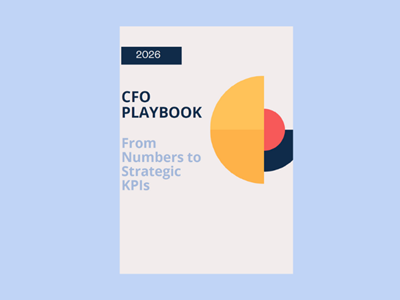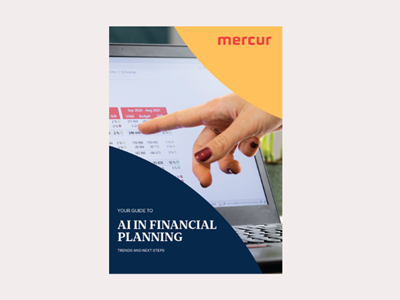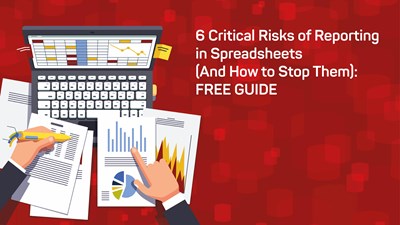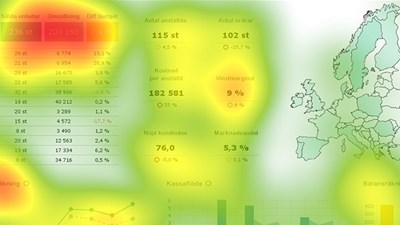
How AI in Finance Can Become a Powerful Tool in Your Decision-Making
Once considered a distant innovation, artificial intelligence is now a powerful tool that influences how organisations run and make decisions across various sectors. From personalised product recommendations to predictive maintenance systems, AI has become embedded in many areas of daily business activity. Yet, when it comes to structured environments such as finance and corporate planning, many leaders still wonder: How can we use AI to make decisions that are smarter, faster, and more strategic?
In this blog post, we explore how AI is evolving from a theoretical concept into a valuable resource for decision-making. This guide offers useful insights for organisations at any stage, from early exploration to actively using AI-powered solutions. We will discuss why AI matters now, how it is applied to support finance functions, key steps for successful implementation, and how finance professionals are evolving alongside these technologies.
Why AI in Finance – and Why Now?
In recent years organisations have seen an explosion in data generation. Traditional methods of analysis and decision-making are no longer sufficient to keep pace with the quantity and complexity of information available. Several factors contribute to the urgent relevance of AI today:
Volume of Data: Organisations generate and collect more data than ever before. AI can process and analyse these large datasets far more efficiently than manual methods.
Speed of Decision-Making: Market conditions shift rapidly. Businesses must access real-time insights to respond effectively to changes.
Advances in Technology: The development of affordable cloud computing solutions has made AI accessible to organisations of all sizes, not just technology giants.
Heightened Expectations: Senior leadership expects finance and operational teams to offer predictive insights and strategic recommendations, rather than retrospective reporting alone.
AI enables businesses to move from simply analysing what has occurred to anticipating what could happen and planning accordingly.
How AI in Finance Supports Decision-Making in Practice
AI in finance is delivering tangible benefits across core business functions, particularly within financial planning and operations. Below are several examples of its practical application:
1. Forecasting and Budgeting
AI in finance leverages historical data, seasonal patterns, and external variables to generate more accurate forecasts and support corporate budgeting. This approach surpasses traditional methods that often depend heavily on manual trend analysis and intuition.
2. Anomaly Detection
Leveraging AI algorithms allows organisations to swiftly identify inconsistencies, errors, or fraudulent activities in financial data that might be overlooked during manual reviews of large datasets.
3. Scenario Planning
AI tools enable finance teams to model a variety of scenarios in a matter of minutes. Questions such as “What would happen if material costs rose by 10%?” or “How would a new pricing strategy affect revenue?” can be explored thoroughly, allowing leadership to make informed strategic decisions.
4. Resource Allocation
Optimising resource distribution is a key advantage of AI in finance. By analysing operational data, AI can propose efficient allocation strategies for capital, staffing, and inventory management.
How to Begin: Practical Steps and Common Pitfalls to Avoid
Implementing AI into decision-making processes requires careful budget planning and consideration. Organisations should consider the following steps:
Define Clear Objectives
Rather than deploying AI across multiple areas simultaneously, focus initially on a single use case where AI can deliver measurable value, such as enhancing forecast accuracy or reducing month-end reporting times.
Prioritise Data Quality
AI depends on high-quality data to function effectively. Before introducing AI tools, organisations should invest time and resources in ensuring their data is accurate, consistent, and up to date. Solutions like Mercur Business Control, which consolidate and streamline data sources, can significantly ease this process.
Foster Transparency and Trust
AI models can sometimes appear opaque. Choosing solutions that offer clear and understandable insights and maintain an audit trail for decision-making will help build trust among users.
Maintain Human Oversight
AI should be viewed as a tool to assist human judgment, not as a replacement for it. Decision-making should continue to involve professional expertise alongside AI-driven recommendations.
Plan for Continuous Improvement
AI models require ongoing refinement to remain accurate and up-to-date. Organisations must plan for iterative updates and adapt AI systems as the business environment changes.
The Changing Role of Finance: Strategic Adviser, Not Just Record Keeper
The expectations placed upon finance teams are shifting fundamentally. Historically, finance was viewed primarily as a reporting and compliance function. Today, finance leaders are increasingly called upon to provide forward-looking insights, identify emerging risks, and contribute to strategic business planning.
AI in finance is enabling this evolution in several ways:
Automating manual, time-consuming processes such as reconciliations and report generation. Allowing finance professionals to focus on analysis, forecasting, and strategic advice.
Supporting the development of narrative skills, enabling finance teams to communicate data-driven insights clearly to broader audiences.
Unlocking Real Business Value with AI
The adoption of AI in decision-making is not just about embracing innovation; it's about delivering concrete business value.
Organisations that successfully leverage AI can achieve:
Faster Decision Cycles: Moving from data gathering to decision-making within significantly reduced timeframes.
Greater Accuracy: Minimising human error and uncovering insights that might otherwise remain hidden.
Risk Reduction: Identifying potential problems earlier and acting proactively.
Enhanced Efficiency: Redirecting human effort towards value-added activities rather than repetitive tasks.
By embedding AI into their operations today and applying it in finance specifically, organisations position themselves to outperform their competitors and respond with agility to changing market conditions.
Turning AI Potential into Practical Success
Artificial intelligence offers considerable promise, but the real opportunity lies in applying it thoughtfully to improve real-world decision-making processes.
Organisations that focus on targeted use cases, invest in data quality, maintain transparency, and integrate AI within existing workflows are well-placed to realise their benefits. Finance professionals who embrace AI not only enhance their strategic value but also help steer their organisations towards future success.
The future of decision-making is already here. Now is the time to make it work to your advantage.
Webinar: Learn how AI can become a powerful tool for your decision making!
We welcome you to our insightful webinar where we'll take a deep dive into how AI can be used as a practical tool to support decision making. It doesn't matter if your organisation is already implementing AI-solutions, or only just starting, either way our webinar will give you insights into:
Why AI, and why now?
Practical examples of how AI can support the finance function
Where do we begin? Useful tips and common pitfalls when implementing
The changing role of the finance function - with AI as a partner
The webinar will be a perfect mix of theory and real-world examples of how AI creates business value - and finishes with a quick introductory demonstration of Mercur Business Control, our market leading platform for budgeting, forecasting, planning, reporting and analysis.
Ready to bring more accuracy and efficiency to your corporate budgeting and forecasting? Explore and book a demo of Mercur’s solutions that can support smarter financial planning today!
 Blog
BlogWhat Is Planning, Budgeting and Forecasting?
Planning, budgeting and forecasting are rarely static. Shifts in the industry often require you to revisit assumptions, adjust targets and adopt new processes. Learn how to strengthen your approach and stay ahead of change.
 Blog
BlogVariance Analysis: A Comprehensive Guide
Senior executives are demanding more detail in their management reports. The amount of data available to finance departments has exploded and decision makers see this as an opportunity to get more insight into how the business is performing.
 Blog
BlogTop PowerBI Alternatives in 2025
Explore the top PowerBI alternatives for 2025. Discover how Mercur delivers integrated planning, budgeting and reporting without the high cost and complexity.
 Blog
BlogRisks with working in spreadsheets
Spreadsheets are an essential tool for all types of organisations and businesses rely on them heavily, particularly for financial computations. The most popular spreadsheet program globally is, of course, Microsoft Excel, it’s used by an estimated 750 million people.
 Blog
BlogThe Collaborative, Smarter Budget
In many organisations manual budgeting processes over-burden staff and create masses of data which overwhelms department heads and stops them seeing the bigger picture.
 Blog
BlogAI in corporate budgeting
Artificial Intelligence (AI) can support decision making in key areas such as budgeting, capital allocation and even corporate strategy and as a result, it is increasingly being deployed in corporate performance management tools (CPM).
 Blog
BlogWhy is our Excel-based budget always out of date?
Excel creates outdated budgets. Every time someone enters a figure, sends a file, or waits for another department to finish their section, your budget falls further behind reality.
 Blog
BlogTop 7 Manager KPIs for Financial and Operational Success
In today's post we'll break down why KPIs matter, which ones offer the most insight for finance and executive teams and how to ensure they're actually driving results.
 Blog
BlogBest Guide to Improve Your Revenue with Flexible Budgeting
Optimise your expenses with flexible budgeting, and learn how to adjust budget to reflect current business activities, market changes and cost fluctuations.
 Blog
BlogThe Powerhouse of EPM Tools
A business’s success heavily relies on having a strong strategy. However, what's even more important is implementing that strategy while tracking and measuring the performance. This can easily be done by investing in enterprise performance management (EPM) software.
 Blog
BlogThe Role of the CFO: Top Priorities and Responsibilities
Today's finance leaders steer more than just budgets and reports. The digital transformation ramps up with the increase of corporate complexity, and so does the role of CFOs.
 Blog
BlogCash Flow Forecasting
Inaccurate cash flow forecasting can be a costly mistake for companies. In today’s volatile market, relying on static annual budgets or manual spreadsheets leaves financial leaders without the agility to respond to uncertainty.
 Blog
BlogHow Automated Reporting Will Transform FP&A in 2026
This article highlights the power of report automation, how to implement it in your business and explores any new opportunities for accurate financial analysis in the long run.
 Blog
BlogCFO Playbook - KPIs for 2026
The role of the CFO is changing fast. Today, the finance function is expected to deliver more than reports — it must drive direction, speed and profitability through clear, actionable KPIs. Learn more in this guide.
 Blog
BlogWhat Is FP&A? Definition, Purpose, and Best Practices
Without solid financial planning and analysis (FP&A), businesses operate in the dark. In this post we go deeper into the process of FP&A and why it’s important for businesses.
 Blog
BlogBalancing Profitability and Sustainability
Sustainability has become a central concern for organisations across the world — and the UK is no exception. This evolving landscape places new demands on financial reporting.
 Blog
BlogTop-Down vs Bottom-Up Budgeting
Budgeting aligns resources with strategic goals, and there are two primary approaches: top-down and bottom-up. Which method wroks best?
 Blog
BlogBetter Revenue Planning
Sales forecasting is the process of predicting future revenue based on past data and trends. Read the blog to learn the best methods to do it right.
 Blog
BlogManagement Reporting Guide: Definition and Tips
Management reporting helps you see what’s really happening in your business. In this guide, we’ll explain what managerial reporting looks like and share practical tips.
 Blog
BlogAI in Financial Planning: Trends and Next Steps
Discover how finance teams are using AI to drive smarter planning, faster insights, and stronger business decisions.
 Blog
Blog3‑Statement Model for Better Financial Forecasting
Financial forecasting is critical for any business that wants to adapt to change. But finance teams keep usingfragmented models and manual processes. The 3-statement financial model is the solution.
 Blog
BlogWhat is management reporting?
Management Reporting refers to the process of creating, analyzing, and presenting information about various aspects of an organization's performance to enable decision-makers to make well-informed decisions about the future.
 Blog
BlogBuild Long-Range Planning for Business Success
Discover how effective long-range planning aligns strategy, finance and operations for smarter decisions and sustainable growth.
 Blog
BlogThe Business Benefits of Integrated Business Planning
This blog explores what IBP is and the typical IBP process. We highlight business benefits and how the right software can be a game-changer for your organisation.
 Blog
BlogHow do finance teams track KPIs across the entire organisation?
Learn how finance teams track KPIs across the entire organisation by consolidating data from multiple sources into a unified system like Mercur.
 Blog
BlogHow to Effectively Budget with Driver-Based Forecasting
Traditional models of forecasting rely on historical data and beliefs. It uses techniques that identify patterns, which are simple to use. However, with these methods, there are some challenges because they are not dynamic with today’s market, and can’t effectively analyse complex data.
 Blog
BlogHow to succeed with your planning, budgeting, and forecasting process
We know it can be challenging to succeed with your planning, budgeting, and forecasting process. Therefore, we have gathered our best tips for you to succeed!
 Blog
BlogHow can AI help CFOs make better decisions?
Artificial Intelligence (AI) has significant potential to enhance decision-making for Chief Financial Officers (CFOs) by providing data-driven insights, automating routine tasks, and enabling more accurate forecasts.
 Blog
BlogMastering Spreadsheets
Where many businesses start small, a simple spreadsheet can adequately perform the limited tasks required of it. As the company grows, your spreadsheets can get more complex and harder to manage, by which point it feels like it will be too difficult to move to a different reporting tool.
 Blog
BlogA practcial guide to scenario planning
Scenario planning gives you a clear, practical way to test assumptions, spot risks and opportunities, and make better strategic choices so your organisation stays resilient when conditions change.
 Blog
BlogBoost Report Readability, Engagement, and Decision-Making
In today’s fast-paced business environment, effective reports and dashboards are crucial for decision-making. Our user study using eye-tracking technology revealed seven key insights into what captures attention.
 Blog
BlogFP&A Trends Shaping Financial Planning in 2025
Many organisations cope with fragmented planning and data quality issues, which slow down their forecasting cycles. This forces organisations to take practical steps to turn ambition into execution.
 Blog
BlogHow to get accurate financial reports without waiting for month-end
You don't need to wait until month-end to see accurate financial reports. With modern financial systems you can access up-to-date reports whenever you need them.
 Blog
BlogBusiness Intelligence Reporting For Finance Teams
The real challenge today isn’t collecting data, it’s making sense of it and fast. Organisations turn to business intelligence (BI) to convert raw data into insight.But how do you actually do it right?
 Blog
BlogFive tips for a successful budget process!
How can you make your budget process more successful and maximise the effort that was invested in creating it? Of course, there are many factors to consider but we’ve chosen to highlight five key areas that will enable and help you create a smoother, value-creating and collaborative budget process.
 Blog
BlogRolling Forecasts: Practical Steps, Benefits, and How to Get Started
Financial planning has changed. Traditional annual budgets can’t keep up with rapid shifts in the market, evolving customer needs, and internal performance dynamics. That’s why many finance teams are turning to a rolling forecast model.
 Blog
BlogHow To Create a Successful Budgeting Process
When done well, budgeting helps organisations stay financially on course, even when things don’t go exactly as planned. Learn how to keep things on track so you avoid surprises and stay focused on your goals.
 Blog
BlogSpreadsheets Risk the Future of the Business
Spreadsheets often start as just a list for storing information and there is minimal process documentation, support or maintenance for these worksheets. Despite the fact that desktop applications such as Microsoft Office are included in the standard configuration of users' PCs, very little formal training is ever given to spreadsheet users.
 Blog
BlogWhat is Corporate Performance Management? (CPM)
CPM, or Corporate Performance Management, is a process within corporate management aimed at measuring and optimizing the performance of an organization. CPM encompasses a range of activities, including budgeting, planning, forecasting, reporting, and analysis.
 Blog
BlogBudgeting in a modern world
Thirty years after its debut, Microsoft Excel is still the preferred tool for budgeting and planning projects. However, its popularity is declining, due in most part to the rise of technology and subscription-based pricing for a myriad of SaaS-based products.
 Blog
BlogBusiness Budgeting Software: How to Choose the Right One
Choosing budgeting software is partly a finance and partly a strategic decision. The right tool helps organisations organise planning cycles, adapt as the market changes and increase accountability across departments. But not every platform will be a good fit.
 Blog
BlogAI and Machine Learning, what is it, and why is it important for the future?
Artificial Intelligence and Machine Learning, what is it, and what is the difference?
 Blog
BlogThe Hidden Cost of Data Silos
If you ever feel like your teams speak different languages when it comes to data, it is a classic symptom of data silos. The information gets stuck in one department, system or tool, making it difficult for anyone to see the full picture.
 Blog
BlogSave time and create a successful budget process
If you’re working in a large organization, you’re probably aware of how time-consuming the budget process can be. In this article we’ll give you tips on how to save time and still create a successful budget process
 Blog
BlogHow EPM Transforms Financial Planning and Forecasting
Struggling to keep plans aligned in a changing market? Discover how EPM helps finance teams move faster, stay accurate and lead with real-time insights.
 Blog
BlogFrom static budgets to agile financial management
Traditional budgeting has long been the cornerstone of financial planning in businesses. But today it can become more of a limitation than a strength. That’s where the concept of Beyond Budgeting comes in.
 Blog
BlogSpreadsheet Risk Management: Best Practices for 2025
Excel has long been a target for hackers; just one click on a malicious attachment can infect your entire network. So, how can you keep using spreadsheets while not sacrificing your safety?
 Blog
BlogSpreadsheets are not Collaborative Tools
Spreadsheets were never designed for collaboration, yet they are the single most used program among teams and co-workers. They often start out as a quick document for storing, formatting or calculating information but evolve into important documents and are often the core records for an organisation.
 Blog
BlogZero-Based vs. Incremental Budgeting
Budgeting sits at the heart of sound financial management. This is why choosing the right technique is crucial for CFOs – it shapes resource allocation, cost control and strategic agility. Incremental and zero-based budgeting are two leading methods that offer distinct approaches.
 Blog
BlogScenario Planning - Better control during uncertain times
Uncertain times create the need for more frequent forecasts and time for analyzing and comparing different future scenarios. We give you 5 tips on how to simulate future scenarios using scenario planning
 Blog
BlogInformed Business Decisions at Maximum Velocity
The ability to process information swiftly is essential. If your business can’t manage your data efficiently, your company’s financial performance will surely underperform. At Mercur we have developed our own database Veloxic which helps Financial Planning and Analysis.
 Blog
BlogWhy xP&A is a powerful game-changer
The newest iteration of planning, analysis and reporting systems is a powerful game-changer that unites company departments and boosts competitiveness. It’s called xP&A – the abbreviation of extended financial planning and analysis.



















































